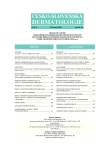Erythema ab igne mimicking livedo racemosa
Erythema ab igne napodobující livedo racemosa
66letý muž měl na zevní straně pravé dolní končetiny rozsáhlou hnědou, nepravidelně síťovitou kresbu napodobující livedo racemosa. Biopsie z léze prokázala hyperkeratózu, zvýšené množství melaninu v keratinocytech, mírný pleomorfismus jader keratinocytů, diskrétní hydropickou degeneraci stratum basale epidermis a nečetné dyskeratotické keratinocyty ve stratum spinosum. V papilárním koriu byly perivaskulárně nevelké extravazáty erytrocytů a malé infiltráty lymfocytů, ojedinělých siderofágů a melanofágů. Tento nález svědčil pro erythema ab igne, které bylo následně potvrzeno i anamnesticky cíleným dotazem. Pacient sedával celou zimu pravou dolní končetinou 10 cm od kamen na tuhá paliva, vždy pouze z této jedné strany. Přímá imunofluorescence prokázala slabou zrnitou pozitivitu ve frakci C3 a pozitivitu fibrinogenu ve stěnách cév superficiálního vaskulárního plexu. IgA, M a G byly negativní. Tento nález má rysy vaskulitidy superficiálního plexu. Je primárně navozena fyzikálním podnětem tepla, stejně jako hydropická degenerace stratum basale epidermis a další epidermální změny.
Klíčová slova:
erythema ab igne – livedo reticularis – klinická podobnost – histopatologie – přímá imunofluorescence
Authors:
L. Pock 1; M. Finsterlová 2; F. Vosmík 3
Authors‘ workplace:
Dermatopatologická laboratoř, Praha
1; Dermatovenerologická ambulance, Čáslav
2; Dermatovenerologická klinika 1. LF UK a VFN, Praha
přednosta prof. MUDr. Jiří Štork, CSc.
3
Published in:
Čes-slov Derm, 80, 2005, No. 6, p. 326-328
Category:
Case Reports
Overview
The large brown irregularly reticular patch mimicking livedo racemosa developed on the lateral side of the right leg in 66-year-old male. The biopsy showed hyperkeratosis, increased amount of melanin in keratinocytes, mild pleomorphism of keratinocyte nuclei, discrete hydropic degeneration of the basal epidermal layer and a few dyskeratotic keratinocytes in the spinous layer. In the papillary dermis there were scant lymphocytic infiltrates with some erythrocytes, rare siderophages and melanophages perivascularly. This finding is suggestive for erythema ab igne, which was supported by the patient’s history. In winter the patient had been sitting with his right leg 10 cm close to the stove, always only on the same side. The direct immunofluorescence showed faint granular positivity of C3 fraction and fibrinogen in the vessel walls of the superficial dermal vascular plexus. IgA, M and IgG fractions were negative. The finding shows features of vasculitis of the superficial plexus which was, primarily, induced by the physical thermal stimulus, as well as the hydropic degeneration of the basal layer of epidermis and other epidermal changes.
Key words:
erythema ab igne – livedo reticularis – clinical resemblance – histopathology – direct immunofluorescence
Labels
Dermatology & STDs Paediatric dermatology & STDsArticle was published in
Czech-Slovak Dermatology

2005 Issue 6
Most read in this issue
- Drug-Induced Autoimmune Skin Diseases
- Lyme Borreliosis
- Erythema ab igne mimicking livedo racemosa
- Psychodermatology and Clinical Praxis
